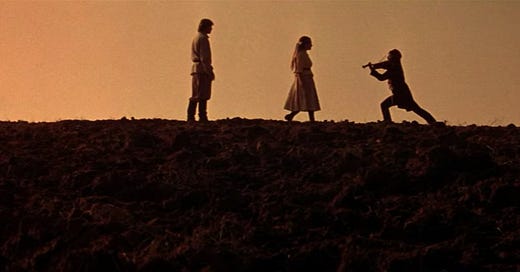100 Movies Every Catholic Should See #74: Fiddler on the Roof (1971)
Directed by Norman Jewison. Starring Topol.
“A fiddler on the roof. Sounds crazy, no? But here in our little village of Anatevka, you might say every one of us is a fiddler on the roof. Trying to scratch out a pleasant, simple tune without breaking his neck…and how do we keep our balance? That I can tell you in one word! TRADITION!”
Tradition, family, love, faith - all of these are very complex things that men let act as guiding influences in their lives. However, what if some of these principles come to clash with each other, what is one to choose? This is the very premise that Fiddler on the Roof presents, following the story of a poor Jewish milkman named Tevye and his struggles in marrying off his daughters, surviving in an increasingly hostile Tsarist Russia, and of course the role of tradition in his life. Released in 1971, the film is an adaptation of the 1964 stage show of the same name; both the play and film were written by Joseph Stein and the movie was directed and produced by award winning director Norman Jewison.
Like all the other movies on this list, Fiddler on the Roof stands as a masterful work of film, carefully curated to maintain faithfulness to the stage musical while still being a movie designed to watch on a screen (unlike a certain musical about a founding father which can be found on Disney+). Filmed on site in Yugoslavia, the color palette chosen reflects the bleakness of the situation in the shtetl of Anatevka, as the Jews who live there are in constant fear of an attack from their gentile neighbors. Despite this, the witty writing and jovial nature of Tevye uplifts the mood of the film and allows it to have truly charming moments as well as heart wrenching emotional ones. The music of course is taken from the musical, but the adapted score comes from the masterful John Williams and won him his first Oscar, beautifully weaving together the songs sung by the cast with the instrumental pieces, using the melodies from songs like ‘Tradition’ and ‘If I Were a Rich Man’ at key moments to make the viewer call back certain themes and ideas presented earlier in the film.
The star of the show is in the performance of Chaim Topol as Tevye, who starred in the stage musical in London before being cast in the leading role. Tevye is the father of five girls and is the town milkman, a humble profession that leaves him dirt poor. Despite this, he is always cracking a smile or giving a wise parable from “the good book” as he puts it, whether that be the case or not. He is also a kind soul, offering food to the fiery Perchik in exchange for lessons for his daughters, despite his reputation as a troublemaker and an outsider. Tevye is also the only character who breaks the fourth wall, with many moments of the film involving a time freeze and a monologue where he talks to God, but really just provides the audience with his perspective on the surrounding events. Tevye is a virtuous man who does not hesitate to do the right thing, but rather the conflict in the film comes about when he becomes unsure of what the right thing to do is.
Now this movie makes the list of 100 movies every Catholic should see, but why should Catholics watch a movie about the hardship of Jews living in Russia? In fact, Christians are seen as antagonists in the film, with a very clear contrast shown when Golde, Tevye’s wife, goes to an Orthodox Church and sees icons of Jewish figures and becomes frightened, as they are portrayed in juxtaposition with the same figures depicted in the town synagogue. The answer comes as the rallying cry of Tevye and the other Jews in Anatevka: tradition! The main theme of the movie is Tevye’s struggle with this concept, as he is forced to choose between the tradition of their community and his daughter’s wishes. Ultimately, he chooses his daughters each time as their love comes before all else in his eyes. Tradition is represented in the film by the titular fiddler, who appears without speaking throughout the film, but most importantly in three scenes. After Tevye promises his eldest daughter to Lazar Wolf, the town butcher, he dances with the fiddler as he has done what is proper according to tradition. During the Chava ballet sequence, Chava is seen dancing with the fiddler and her love Fyedka, a Christian with whom she runs away, ultimately rejecting the fiddler and tradition. Finally, at the end of the movie the fiddler is seen following Tevye away, showing that even though he has acted against tradition, it is always something that he will have with him.
What Tevye discovers is that tradition is not something that remains stagnant, but rather is something that if allowed to be stagnant eventually breaks apart. The traditions he has become something new because of his love for his daughters. He even finds it within himself to say “God be with you” to Chava, even after disowning her for rejecting his decision, showing that deep down he still loves her and wishes for her happiness. This kind of living tradition should speak loudly to Catholics as we have a similar understanding of tradition. The Fathers of the Second Vatican Council teach the following in Dei Verbum:
This tradition which comes from the Apostles develops in the Church with the help of the Holy Spirit. For there is a growth in the understanding of the realities and the words which have been handed down. This happens through the contemplation and study made by believers, who treasure these things in their hearts (see Luke, 2:19, 51) through a penetrating understanding of the spiritual realities which they experience, and through the preaching of those who have received through Episcopal succession the sure gift of truth. For as the centuries succeed one another, the Church constantly moves forward toward the fullness of divine truth until the words of God reach their complete fulfillment in her.
Tevye shows us that you can be a virtuous man even in the face of great trial and tribulation, holding fast to a living tradition that grows through love. Fiddler on the Roof is a witty, clever musical with excellent characters who make you cheer, laugh, and cry for them. Combine that with catchy showtunes, a compelling storyline, and beautiful cinematography and you truly have a match made in heaven.






